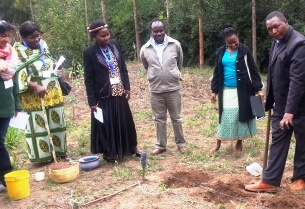Mothers’ Union Provincial leaders recently came together in Nairobi, Kenya, to share best practice and learning, and to discuss post-2015 priorities to take to the Africa Faith Leaders’ Summit in Uganda.
The Council of Anglican Provinces of Africa (CAPA) hosted ten Provincial Mothers’ Union Community Development Coordinators at a three-day consultation in Nairobi, Kenya.
The consultation took place from 22nd to 26th June, and was attended by Mothers’ Union coordinators from the African Anglican Provinces of Burundi, Rwanda, Tanzania, Uganda, Central Africa, Kenya, West Africa, Indian Ocean, South Sudan & Sudan and Congo. Participants brought to the consultation a firm understanding of women’s ministry in the Anglican Communion across Africa.
Anglican Alliance Regional Facilitator for Africa, June Nderitu, said, “It was extremely exciting to see almost all of Africa represented at this crucial time, when the continent seeks greater participation in global debates that have such a deep impact on development.”
Main objectives for the meeting included the sharing of experiences and best practices on the status of women’s ministry in the different Provinces, and to discuss the post 2015 development agenda.
The overall expected outcomes were the beginnings of a network to bring together those in women’s ministry in Africa. The women leaders’ input on post-2015 development was later taken to the Africa Faith Leaders’ Summit that took place the following week in Kampala, Uganda.
Due to the structure of the Anglican Church in Africa, the women leaders were all drawn from the Mothers’ Union, which has a presence in all of the Provinces of Africa. Mothers’ Union is also the single largest body bringing together women in Africa due to its elaborate structure and shared values.
The consultation was organised as a follow-up to the Primates’ Wives meeting, supported by Mothers’ Union, held in February 2014 in Lagos, Nigeria. At the end of this meeting, the Primates’ Wives released a communiqué that was shared with the participants.
The women had an opportunity to share experiences from their Provinces. This involved brief reports on the status of women’s ministry followed by a question and answer session. Some of the highlights from this sharing proved that the Mothers’ Union has celebrated great impact in the communities its members serve.
Of particular interest were two projects shared from the Provinces of Burundi and South Sudan & Sudan as well as the Province of Central Africa.
Hundreds of thousands of people in South Sudan, Sudan and Burundi have gone through the Literacy & Financial Education Programme and have now achieved basic reading and writing, according to the experience shared by Provincial Mothers’ Union Community Development Coordinators Harriet Baka from South Sudan and Claudette Kigeme from Burundi.
Another discussion point was the Mothers’ Union involvement in advocacy in South Sudan, being one of the key Anglican agents in the relief distribution and training taking place there following the recent conflict.
In Zambia, Agnes Mupeta from Central Africa gave a captivating account of how the Mothers’ Union initiative to train and work with community birth attendants has led to improved maternal health and a reduction in infant deaths, contributing to the attainment of Millennium Development Goals (MDGs) Four and Five in Zambia.
What followed was a session to look over the MDGs in light of their upcoming deadline in 2015. Groups discussed the questions, “What achievements has your country made since 2000?” and “What gaps exist in the goals as they are now?”
Participants brainstormed in plenary as well as in regional groups on the areas they thought Africa should prioritise in the post 2015 development agenda, especially in preparation for the Africa Faith Leaders’ Summit.
There was general consensus that while the MDGs focus on the issues that affect the poorest of the continent, there was need to have greater involvement of the people themselves in determining their priorities. Of utmost importance was the need for the church to engage governments in keeping them accountable in achieving development targets. The issue of peace and security can also not be ignored in Africa where many countries are experiencing conflicts.
The women leaders had a rare opportunity to visit a farmer practising ‘Farming God’s Way’ in Ndeiya, Kiambu County. This is a brand of conservation farming that follows biblical principles. It is based on the ‘zero cultivation’ philosophy that ensures healing and regeneration of the soil. The programme is run by the Anglican Development Services of Mt. Kenya Region.
Sharing best practice already taking place in Kenya in the area of food security was the purpose of the exposure visit. Participants learnt that ‘Farming God’s Way’ had in fact led to food security at household level which had led to increased income for the farmers. This is because this method ensures production throughout the year due to conservation and maximisation of soil moisture.
The meeting ended after the participants drafted and adopted a message of solidarity with the Women and Girls of the Province of Nigeria following the kidnapping of girls from a school by terror groups, and a communiqué on the consultative meeting was released.
Links
Communiqué released by MU Provincial Leaders
Message from MU leaders to Women and Girls of Nigeria
In the picture: Participants visit a Farming God’s Way project in Kenya.

